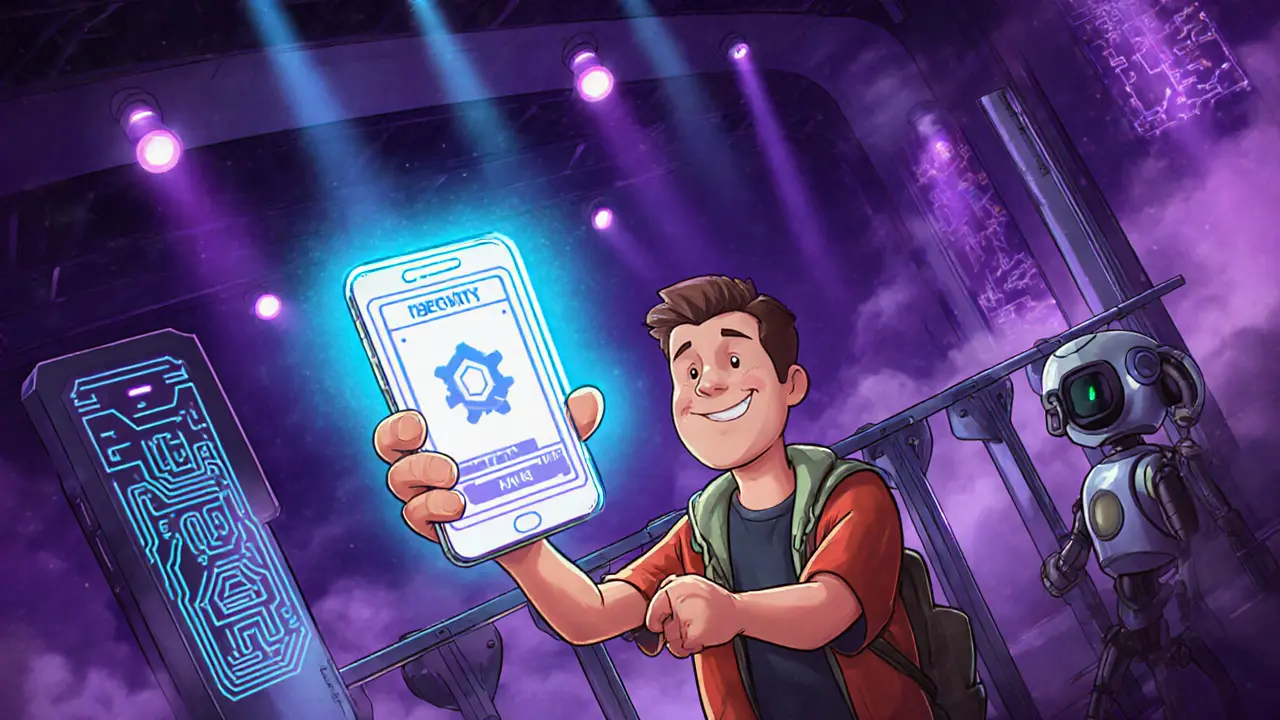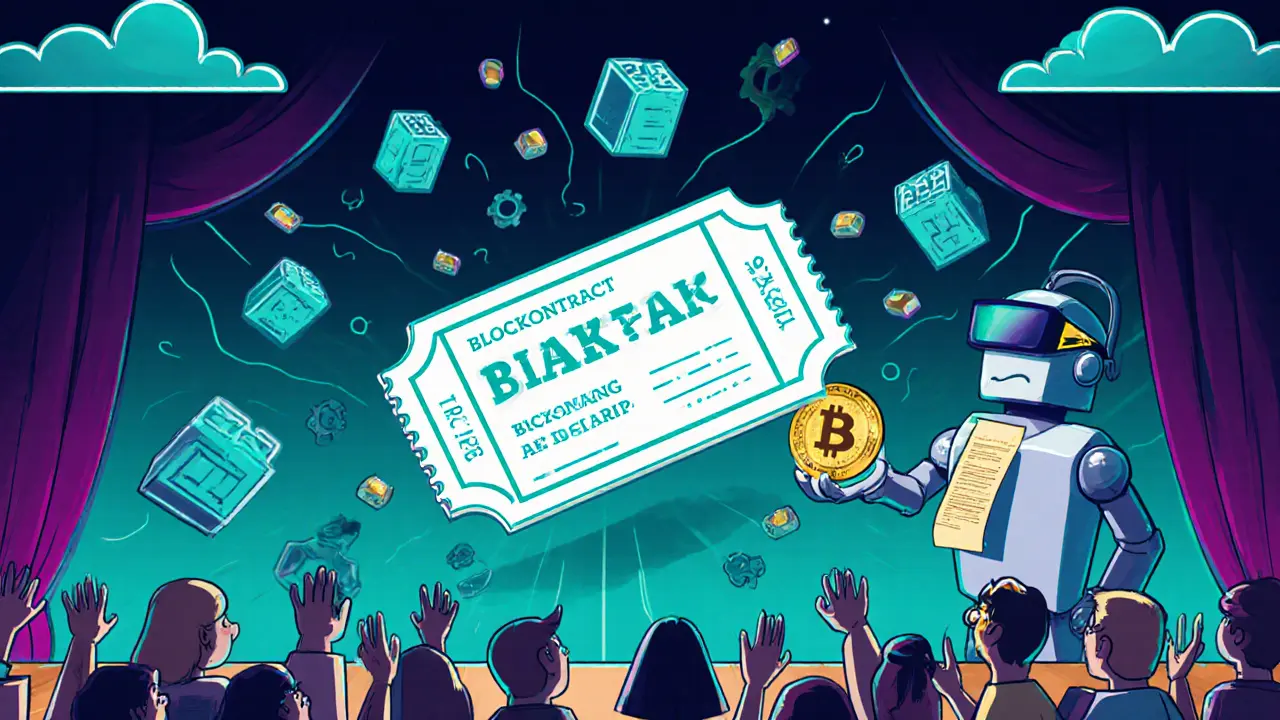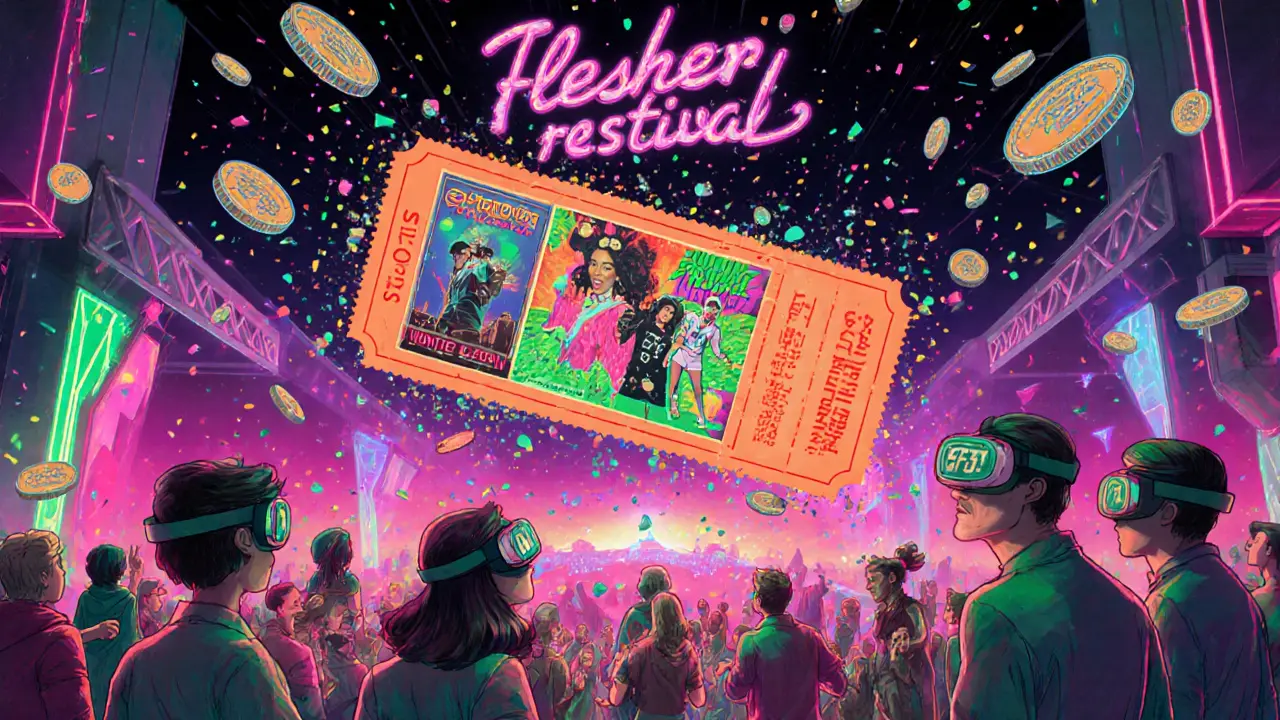Boost Fan Engagement with NFT Ticketing

Mar, 3 2025
NFT Ticket Resale Calculator
Calculate Your Royalties
Estimate potential revenue from secondary ticket sales using the royalty model described in the article.
How It Works
NFT tickets enable event organizers to earn a percentage of each secondary sale. This calculator helps estimate your potential revenue based on:
- Your ticket price and expected resale value
- The royalty percentage you set in the smart contract
- The number of resale transactions you expect
Estimated Royalties
Results will appear here after calculation
Imagine walking into a concert and, instead of a paper stub, you pull out a sleek digital token that not only gets you past the gate but also drops exclusive merch, backstage invites, and a lasting souvenir you can brag about online. That’s the promise of NFT tickets - a blend of blockchain security and fan‑first perks that’s reshaping how we experience live events.
What Exactly Is an NFT Ticket?
NFT ticket is a non‑fungible digital asset stored on a blockchain that serves as both event admission and collectible memorabilia. Unlike traditional tickets, each NFT ticket carries a unique identifier, provenance data, and can be programmed with smart contracts to unlock extra benefits for the holder.
At its core, an NFT ticket leverages the same technology behind crypto‑art and digital collectibles, but its utility stretches far beyond ownership proof. It becomes a portable passport to a community, a source of ongoing rewards, and a revenue source for organizers.
Why Blockchain Matters for Ticketing
Blockchain is a distributed ledger that records transactions immutably and transparently. When a ticket lives on a blockchain, its authenticity is guaranteed, and every transfer is publicly traceable. This eliminates three longstanding pain points:
- Counterfeiting: Fake tickets can be printed endlessly, but a blockchain‑anchored token can’t be duplicated.
- Scalping: Smart contracts can cap resale prices or allocate a percentage of each secondary sale back to the event organizer.
- Lost tickets: The token lives in a digital wallet, so misplacing a paper stub is no longer an issue.
Beyond security, the blockchain’s transparent ownership history gives organizers real‑time insight into who holds tickets and how they move through the secondary market.
Core Technical Ingredients
Building an NFT ticket ecosystem typically involves four building blocks:
- Smart contracts: Self‑executing code that enforces rules - e.g., pay a 5% royalty on every resale.
- Digital wallets: Apps like MetaMask or Trust Wallet where fans store their NFTs safely.
- Metadata layers: Visual artwork, QR codes, or embedded links that give each ticket its unique look and function.
- Airdrop mechanisms: Automated token distributions that reward ticket holders with new collectibles, discount vouchers, or exclusive access.
When these pieces click together, the ticket transforms from a static entry pass into a living engagement hub.
How NFT Tickets Supercharge Fan Engagement
Traditional tickets are a one‑way transaction - you buy, you attend, you’re done. NFT tickets flip that script by creating a continuous dialogue between fans and organizers.
- Exclusive content: Holders might receive a backstage video that’s not posted anywhere else.
- Merch discounts: A smart contract can auto‑apply a 10% discount on official merch when the NFT is scanned at checkout.
- VIP experiences: Access to a virtual meet‑and‑greet, priority seating for future shows, or early‑bird ticket sales for the next tour.
- Community tokens: By owning the NFT, fans join an exclusive Discord or Telegram group where organizers drop news, polls, and surprise giveaways.
These perks can be delivered at three crucial moments: before the event (building hype), during the event (real‑time interaction), and after the event (long‑term loyalty).

Real‑World Success Stories
Several high‑profile events have already piloted NFT ticketing:
- EXIT Festival: Partnered with NFT‑Tix for a multi‑year rollout, offering dynamic artwork and royalty‑backed secondary sales.
- Sports clubs: Teams mint digital trading cards linked to match tickets, providing highlights and behind‑the‑scenes footage that fans can trade.
- POAP (Proof‑of‑Attendance Protocol): Free NFT badges handed out at conferences and meetups, unlocking alumni communities and future discounts.
These examples show that the technology works across music, sports, and conference sectors, each tailoring the NFT experience to their audience’s preferences.
Revenue Opportunities for Organizers
Beyond ticket sales, NFT tickets open new money streams:
- Royalties on resale: Every time a ticket flips on a secondary market, a pre‑set percentage (often 5‑10%) returns to the event promoter.
- Collectible value: Fans may hold onto the NFT as a memorabilia piece, potentially trading it later at a premium.
- Sponsored airdrops: Brands can sponsor exclusive merch drops, paying a fee for exposure to a highly engaged fan base.
- Data insights: Anonymized wallet activity reveals buying patterns, enabling hyper‑targeted marketing for future tours.
All of these revenue levers sit on top of the traditional gate‑revenue, making the event’s financial model more resilient.
Building Ongoing Communities
When fans keep their NFT tickets, they also retain a digital identity linked to the event. Organizers can nurture this relationship in several ways:
- Alumni clubs: Past attendees receive invites to exclusive after‑parties or sneak‑peeks at upcoming releases.
- Season passes: A single NFT can grant access to an entire festival series, encouraging repeat attendance.
- Gamified rewards: Earn points for attending multiple shows, then redeem for backstage passes or limited‑edition merch.
This shift turns a one‑off ticket purchase into a membership model, where value accrues over time.
Challenges to Consider
While the upside is compelling, there are hurdles to navigate:
- Technical onboarding: Fans need to set up a digital wallet, which can be intimidating for non‑tech‑savvy users.
- Environmental concerns: Some blockchains consume significant energy; however, many now use proof‑of‑stake, slashing carbon footprints.
- Market volatility: Pricing tickets in crypto can expose buyers to price swings, so many organizers price in fiat with a crypto payment option.
- Regulatory landscape: Ticket resale royalties must comply with local consumer‑protection laws.
Addressing these issues early-by offering wallet‑setup guides, choosing low‑energy chains, and providing fiat alternatives-smooths the path to adoption.

Future Outlook: Where NFT Ticketing Is Headed
Looking ahead to 2026 and beyond, several trends are poised to accelerate NFT ticketing:
- Hybrid events: Physical concerts paired with virtual reality experiences, all unlocked via the same NFT.
- Dynamic NFTs: Tickets that evolve-adding new artwork or perks as the event nears, creating a sense of anticipation.
- Cross‑brand collaborations: Musicians teaming with fashion houses to embed limited‑edition wearables inside the ticket metadata.
- Enhanced analytics: Real‑time heatmaps of wallet locations, informing venue logistics and crowd‑control strategies.
These developments suggest that NFT tickets will become a standard layer of the live‑event stack, not a novelty.
Practical Checklist for Organizers Ready to Launch
| Aspect | NFT Ticketing | Traditional |
|---|---|---|
| Security | Immutable blockchain verification | Paper or PDF can be forged |
| Scalping Control | Smart‑contract resale caps & royalties | Limited enforcement |
| Fan Perks | Built‑in airdrops, exclusive content | Rarely offered |
| Data Insights | On‑chain ownership analytics | Aggregate sales only |
| Revenue Streams | Secondary‑sale royalties, sponsored airdrops | Ticket price only |
Use this table to brief your internal team and decide which features align with your brand strategy.
Step‑by‑Step: Rolling Out Your First NFT Ticket Sale
- Choose a blockchain: Look for low fees and proof‑of‑stake (e.g., Polygon, Solana).
- Design the NFT: Commission artwork, embed QR code, and define metadata.
- Write the smart contract: Include royalty percentage, resale limits, and airdrop triggers.
- Set up wallet integration: Partner with wallet providers to enable one‑click purchases.
- Launch a marketing campaign: Highlight exclusive perks, showcase early‑bird airdrops.
- Monitor secondary market: Track resale activity, enforce royalty payments.
- Deliver post‑event rewards: Airdrop thank‑you NFTs, invite holders to the next event.
Following these steps keeps the rollout smooth and maximizes fan excitement.
Frequently Asked Questions
Do I need cryptocurrency to buy an NFT ticket?
Most platforms accept fiat credit‑card payments that are instantly converted to crypto behind the scenes, so you don’t need to own Bitcoin or Ether yourself.
What happens if I lose access to my digital wallet?
Reputable wallets offer seed‑phrase recovery. Keep that phrase safe - it’s the master key to restore your NFTs.
Can I resell my NFT ticket?
Yes, but the smart contract can enforce a maximum resale price and automatically send a royalty back to the event organizer.
Are NFT tickets environmentally friendly?
If you choose a proof‑of‑stake chain like Polygon, the carbon impact is comparable to a typical web transaction - far lower than proof‑of‑work networks.
How do airdrops work for ticket holders?
The smart contract detects the wallet address that owns the NFT and automatically sends a new token (e.g., a discount voucher or exclusive artwork) to that address at a pre‑set time.
By turning tickets into living digital assets, event creators can keep the conversation going long after the lights go out. The technology is still early, but the building blocks are solid, and the fan‑centric benefits are too compelling to ignore.